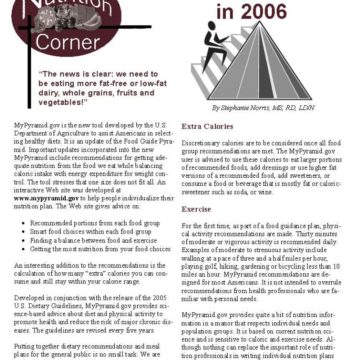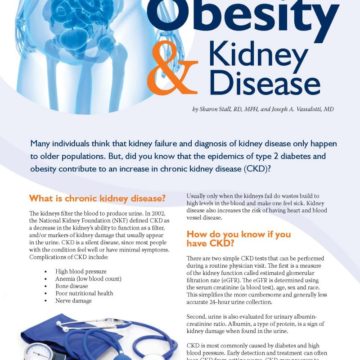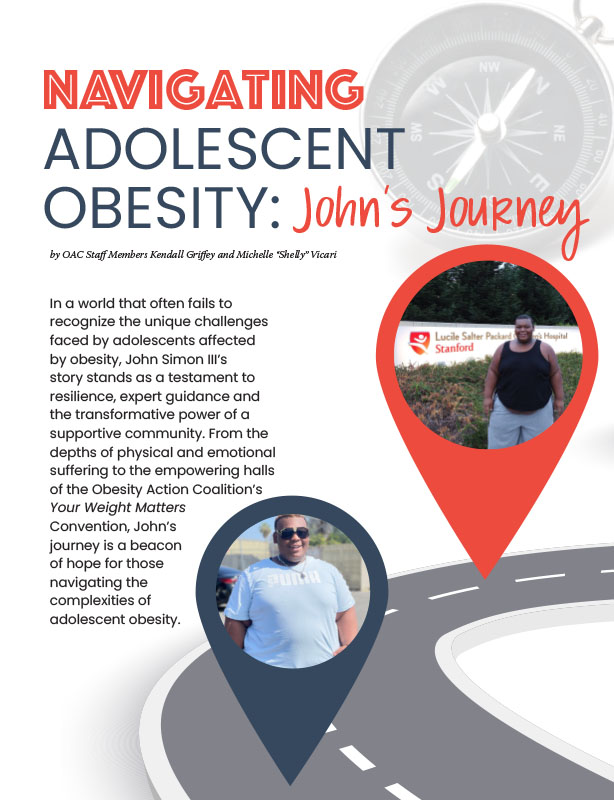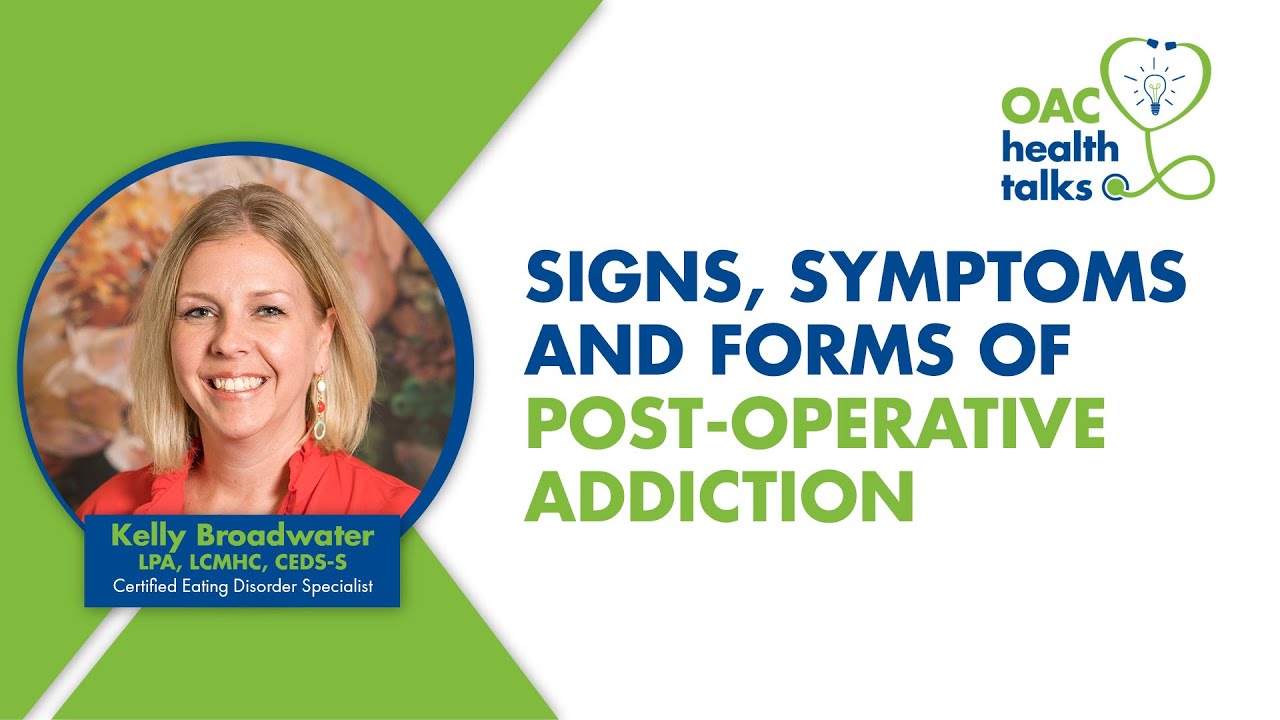Bariatric Surgery as a Treatment for Type 2 Diabetes

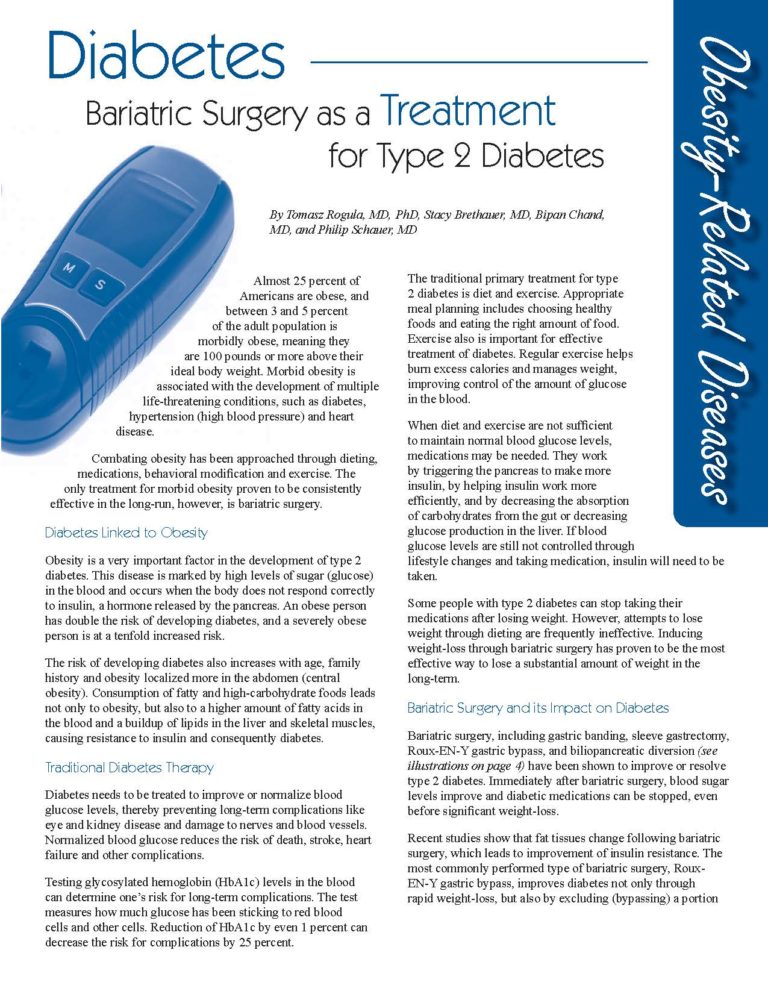
by Tomasz Rogula, MD, PhD, Stacy Brethauer, MD, Bipan Chand, MD, and Phillip Schauer, MD
Spring 2008
Almost 25 percent of Americans are affected by obesity, and between 3 and 5 percent of the adult population is severely affected by obesity, meaning they are 100 pounds or more above their ideal body weight. Morbid obesity is associated with the development of multiple life-threatening conditions, such as diabetes, hypertension (high blood pressure) and heart disease.
Combating obesity has been approached through dieting, medications, behavioral modification and exercise. The only treatment for morbid obesity proven to be consistently effective in the long-run, however, is bariatric surgery.
Diabetes Linked to Obesity
Obesity is a very important factor in the development of type 2 diabetes. This disease is marked by high levels of sugar (glucose) in the blood and occurs when the body does not respond correctly to insulin, a hormone released by the pancreas. A person with obesity has double the risk of developing diabetes, and a severely person with obesity is at a tenfold increased risk.
The risk of developing diabetes also increases with age, family history and obesity localized more in the abdomen (central obesity). Consumption of fatty and high-carbohydrate foods leads not only to obesity, but also to a higher amount of fatty acids in the blood and a buildup of lipids in the liver and skeletal muscles, causing resistance to insulin and consequently diabetes.
Traditional Diabetes Therapy
Diabetes needs to be treated to improve or normalize blood glucose levels, thereby preventing long-term complications like eye and kidney disease and damage to nerves and blood vessels. Normalized blood glucose reduces the risk of death, stroke, heart failure and other complications.
Testing glycosylated hemoglobin (HbA1c) levels in the blood can determine one’s risk for long-term complications. The test measures how much glucose has been sticking to red blood cells and other cells. Reduction of HbA1c by even 1 percent can decrease the risk for complications by 25 percent.
The traditional primary treatment for type 2 diabetes is diet and exercise. Appropriate meal planning includes choosing healthy foods and eating the right amount of food. Exercise also is important for effective treatment of diabetes. Regular exercise helps burn excess calories and manages weight, improving control of the amount of glucose in the blood.
When diet and exercise are not sufficient to maintain normal blood glucose levels, medications may be needed. They work by triggering the pancreas to make more insulin, by helping insulin work more efficiently, and by decreasing the absorption of carbohydrates from the gut or decreasing glucose production in the liver. If blood glucose levels are still not controlled through lifestyle changes and taking medication, insulin will need to be taken.
Some people with type 2 diabetes can stop taking their medications after losing weight. However, attempts to lose weight through dieting are frequently ineffective. Inducing weight-loss through bariatric surgery has proven to be the most effective way to lose a substantial amount of weight in the long-term.
Bariatric Surgery and its Impact on Diabetes
Bariatric surgery, including gastric banding, sleeve gastrectomy, Roux-EN-Y gastric bypass, and biliopancreatic diversion have been shown to improve or resolve type 2 diabetes. Immediately after bariatric surgery, blood sugar levels improve and diabetic medications can be stopped, even before significant weight-loss.
Recent studies show that fat tissues change following bariatric surgery, which leads to improvement of insulin resistance. The most commonly performed type of bariatric surgery, Roux-EN-Y gastric bypass, improves diabetes not only through rapid weight-loss, but also by excluding (bypassing) a portion of the small intestine from the flow of nutrients. This means that gastric bypass surgery improves diabetes even before weight is lost. The production of various gut hormones is changed following gastric bypass, leading to improvement of insulin secretion.
Almost 90 percent of patients with obesity who undergo Roux-EN-Y gastric bypass are free from diabetes one year after surgery. These results are typically persistent for the rest of life, as long as a healthy body weight is maintained.
Patients who have a milder form of diabetes (controlled with diet) for less than five years, and who achieve greater weight-loss after surgery, are more likely to also achieve complete resolution of diabetes. Almost 20 percent of patients with severe obesity develop diabetes. However, weight-loss following gastric bypass in non-diabetic patients with obesity decreases their likelihood of developing diabetes by 60 percent over four years.
Research Confirms the Effectiveness of Bariatric Surgery
In one study of 1,025 patients with obesity treated with RouxEN-Y gastric bypass, 15 percent of the participants had type 2 diabetes. One year after surgery, diabetes had resolved in 83 percent of the patients. At five to seven years, this figure had risen to 86 percent.
In a similar study of 1,160 patients in which 21 percent were pre-diabetic or had type 2 diabetes, surgery decreased their body mass index (BMI – a mathematical formula that factors a person’s height and weight in determining obesity) from 50 to 34 for an average weight-loss of 97 pounds and 60 percent loss of excess weight2. Blood sugar levels returned to normal for 83 percent of the patients. Following surgery, 80 percent of patients no longer needed oral diabetes medications, and 79 percent were able to stop insulin injections.
Resolution of diabetes is measured by normalized fasting blood sugar and glycosylated hemoglobin (HbA1c) concentrations.
Following surgery, 80 percent of patients do not need to take diabetic pills and are able to stop their insulin. Gastric banding operation carries a lower risk of complications compared to Roux-EN-Y gastric bypass and has also been shown to resolve type 2 diabetes in about 50-70 percent of patients3.
Reduction of Diabetic Complications
Gastric bypass surgery reduces one’s risk of death primarily by decreasing the number of deaths from heart failure. Every year, diabetic patients who are treated with medication see their risk of dying from complications of the disease increase by 4.5 percent compared with a 0.5 percent chance of dying from undergoing bariatric surgery. While the number of diabetic patients needing oral medication or insulin shots reaches almost 90 percent over time, the need for medical management falls to less than 8 percent for those who have gastric bypass surgery.
Controlling blood glucose levels with bariatric surgery may also decrease the risk of blindness and kidney failure associated with diabetes. Some studies show that every 1 percent drop in HbA1c causes a relative risk reduction of 25 percent to 45 percent.
Risks of Surgery vs. the Risks of Diabetes
Bariatric operations do carry some risk, but the risk of having major complications or dying from the surgery is 0.5 percent, a reasonable risk considering the tremendous benefits of minimizing the progression of type 2 diabetes in individuals with obesity.
Developing an intestinal leak is the most likely cause of death following gastric bypass surgery. Having diabetes does increase the risk of developing a leak; however, the patient’s age and BMI, as well as the surgeon’s experience, are more influential in determining the likelihood of developing a leak. Most leaks can be handled without additional surgery and have no major impact on long-term weight-loss or improvement of diabetes.
Those with diabetes are also more likely to develop wound infections. The infection rate, however, is low and strict control of blood glucose significantly decreases wound infections and other complications following bariatric surgery.
Taking into consideration the risks-to-benefits ratio, bariatric surgery is far more beneficial for patients than medical treatment and one is more likely to die from complications from diabetes than from complications from bariatric surgery.
The Earlier the Surgery, the Better the Results
The longer a patient has diabetes the greater the likelihood of irreversible loss of insulin production. A key finding of all studies is that the less time one suffers from diabetes, the more likely he or she will have complete remission of diabetes following surgery.
About the Authors:
Tomasz Rogula, MD, PhD, is an associate staff surgeon at the Cleveland Clinic Bariatric & Metabolic Institute.
Stacy Brethauer, MD, is the assistant Laparoscopic Fellowship director and associate staff surgeon at the Cleveland Clinic Bariatric & Metabolic Institute.
Bipan Chand, MD, is the Director of Surgical Endoscopy, Advanced Laparoscopic and Bariatric Surgery and staff surgeon at the Cleveland Clinic Bariatric & Metabolic Institute.
Philip Schauer, MD, is professor of Surgery, Cleveland Clinic Lerner College of Medicine, and director of the Cleveland Bariatric & Metabolic Institute. He is also the past president of the American Society for Metabolic and Bariatric Surgery.
References:
1. Pories WJ, Swanson MS, MacDonald KG, et al. Who would have thought it? An operation proves to be the most effective therapy for adult-on-set diabetes mellitus. Ann Surg, 1995: 222:339-352.
2. Schauer PR, Burguera B, Ikramuddin S, cottam D, Gourash W, Hamad G, Eid GM, Mattar S, Ramanathan R, Barinas-Mitchel E, Rao RH, Kuller L, Kelley D. Effect of laparoscopic Roux-en-Y gastric bypass on type 2 diabetes mellitus. Ann Surg 2003 238:467-484; discussion 84-85.
3. Dixon JB, O’Brien PE, Playfair J, Chapman L, Schachter LM, Skinner S, Proietto J, Bailey M, Anderson M. Adjustable gastric banding and conventional therapy for type 2 diabetes: a randomized controlled trial. JAMA. 2008 Jan 23;299(3):341-3.
by OAC Staff Members Kendall Griffey and Michelle “Shelly” Vicari Winter 2024 In a world that often…
Read Articleby Rachel Engelhart, RD; Kelly Donahue, PhD; and Renu Mansukhani, MD Summer 2023 Welcome to the first…
Read ArticlePost-operative addiction is often overly simplified as transfer addiction or cross-addiction, assuming individuals “trade” compulsive eating for…
View Video




